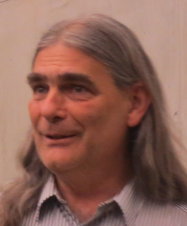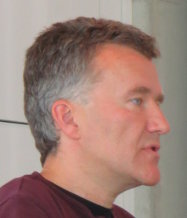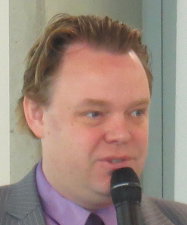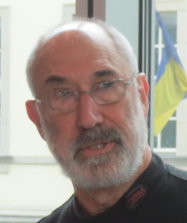Notable quotes from the Economics and the Commons Conference
Two and a half years ago, during the (first) International Commons Conference in Berlin, I collected some quotes that I considered insightful or funny. This time, at the Economics and the Commons Conference, I did it again.
 Silke Helfrich [DE]:
Silke Helfrich [DE]:
- The commons as institutions are older than any state in the world.
- Every commons has a material basis. Every commons needs energy, and every commoner needs food. And all the natural commons require knowledge. We have to know how to cultivate a commons. So every commons is a physical commons and a knowledge commons.
- We should wonder whether the commons should really be open to everyone, including the enclosers.
- The commons does not scale up but rather crystallizes, like a crystal of atoms, into a connected pattern. The commons, like crystals, grow into all directions.
- Every economy is commons-based.
- He/she who takes from the commons has to contribute to the commons.
Armin Medosch [DE]:
- The commons is a beautiful form of exhaustion.
- “Communist” seems to be the elephant in the room. It has the same root as “commons,” but everyone is afraid to mention it.
Johannes Heimrath [DE]:
- Music is a commons, and rhythm is a commons, too.
Barbara Unmüßig [DE]:
- The distinction between so-called natural commons and knowledge commons is somewhat artificial. All commons are based on knowledge in one way or another, and all commons are social activities. So all commons are knowledge commons and all commons are social commons.
- Only if we are not afraid of imagining the world of tomorrow we can start building it in the world of today.
- The most important aspect of the commons is the ability to listen to each other.
- Human history is the history of unfolding the power of indirect reciprocity.
- The stigmergic law: Given enough people, you’ll find a nerd for every task that needs to be done.
- Dealing with money and dealing with the state is only a waste of resources.
- Commons are a social creation, the result of serious popular struggle and theoretical reflection.
- Products should be also commons and not commodities.
- Internalizing external costs requires a centralized price determination mechanism by a bureaucracy of experts. But decentralized, non-bureaucratic price negotiation is what markets are best at. It’s interesting that in order to save the market, some economists want to do away with what markets are good at.
- By weighting preferences by purchasing power, markets allocate goods to those who need them least.
- The most serious problems we face cannot be solved by free markets. We need collective action and common ownership.
- A knowledge commons is in the center of each and every commons.
- Commoning is about doing it.
- Instead of a process of gradual inclusion and emancipation, the term “reform” now, in the neoliberal order, has acquired the opposite meaning. Reform today is mainly a process of privatization and destruction of the public sector.
- The moment somebody holds shares, they are only interested in the value of those shares and how it increases.
- We won’t establish commoning institutions by reform practices, by always following the law. In order to build new institutions, you must play with the existing rules, you must occasionally break the law.
- There is no commons without collective actions. And collective actions is about you – and you – and you!
Carolina Botero [ES]:
- In the English language, you are lucky to have the word “commons.” In Spanish, we don’t even have a good word for it.
- If we want to call ourselves commoners, we have to think about infrastructures – because the other side does.
- When I talk with politicians, I can’t start with the commons. It would take me three years to explain.
- The current tragedy of the commons is the lack of knowledge on the commons.
- When and how did we accept that the autonomy of all is subservient to control of knowledge by a few?
 Brigitte Kratzwald [DE]:
Brigitte Kratzwald [DE]:
- We need to move beyond the whole of work, towards the whole of life.
- Plant seeds are the oldest information commons. Seeds contain DNA, and DNA encodes information. The EU claims that seed regulations are about consumer safety, but the net effect is an enclosure.
Hervé Le Crosnier [FR]:
- With knowledge commons we should care not only about the right to reproduce (to copy), but also about the right to produce (to create and extend). Excluding people from the commons can be achieved by prohibiting them from contributing. That is the case with current scientists, whose findings are being patented by their universities.
- We need to stop being apologetic about these monopolies that are not just harmless but disastrous. The copyright monopoly was never essential for artists to make money. Patent monopolies are not necessary to make drugs.
- The remix culture would be impossible without disobedience. We have to create new customs because only that will give us new rights. In 50 years, people will say: “We have the right to remix and share, because we have always done that.” But that can only happen if we ignore the rules that prohibit it now.
- Only people willing to engage in symbolic violence (violating the laws that prohibit sharing), have the power to influence the regulations.
- To protect the commons, we need property. A different kind of property that prevents those who want to exploit and destroy the commons from doing so.
- When we study animals and the history of humanity we understand that labor, work has evolved from play. And now we ask ourselves how we can redefine work so that it becomes play again and still remains a useful activity.
- I don’t want to have the right to be a slave.
- There are many structural similarities between caring and commoning.
- Our core question is how to combine caring and commoning to ensure the reproduction of society as a whole.
- We should work to live and not live to work. And work should be fun as much as possible.
- The scales of production are changing. De-scaled, distributed, self-organized production is much more possible today.
- This is commoning: intensely interacting with each other, not just waiting for your term to speak but really listening to what others have to say and share.
- The biggest challenge is to get people who are commoners to realize that they are commoners.






Super, schon rumgezwitschert. Danke!
Werde ich auch in meinen nächsten „take-away from ECC“ nehmen.
Eine kleine Korrektur noch: „whether the commons should really be open to everyone, including the ENCLOSERS“. Ist nur ein Detail, aber wichtig.
@Silke: hab ich korrigiert, danke!